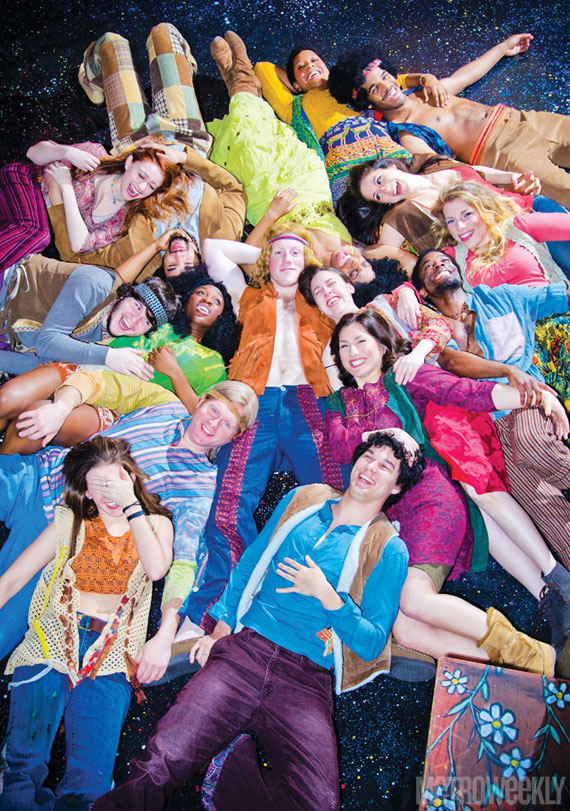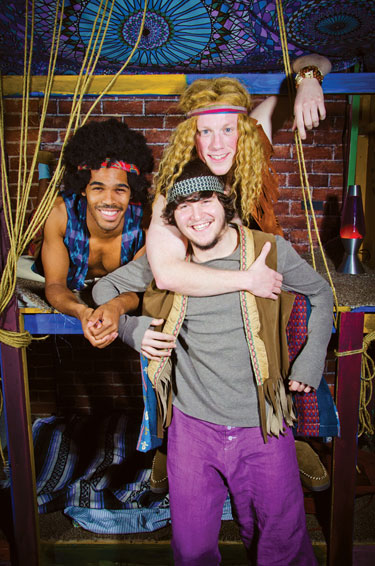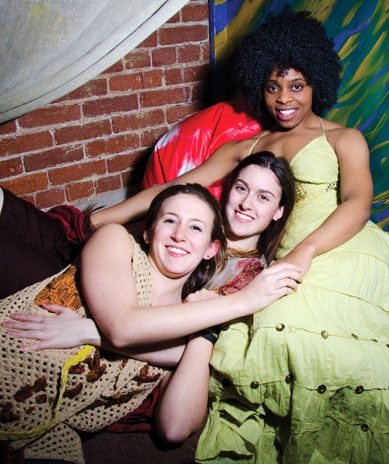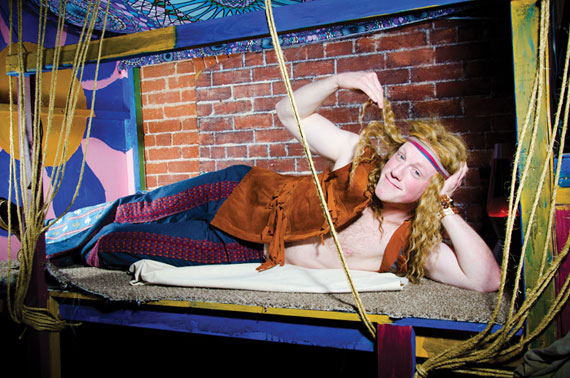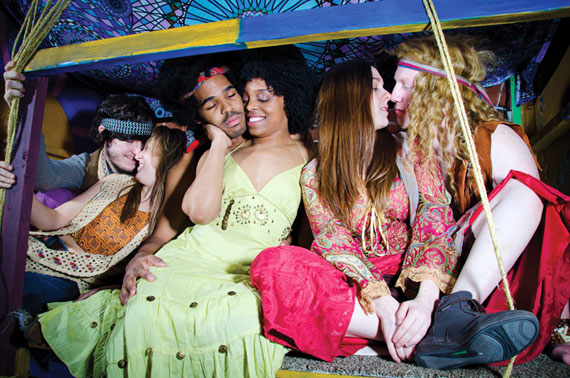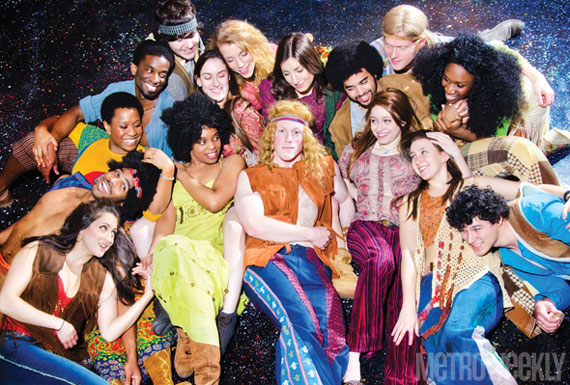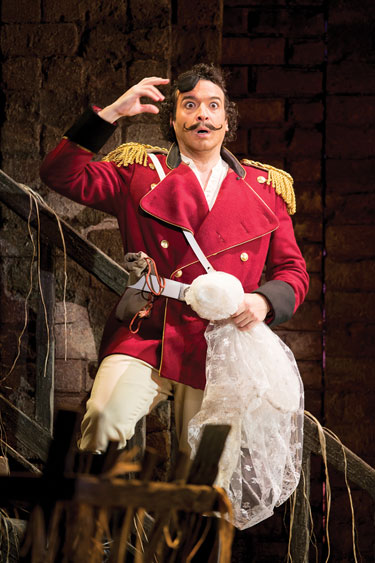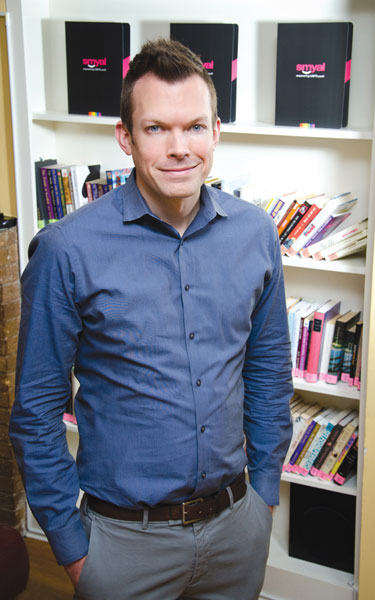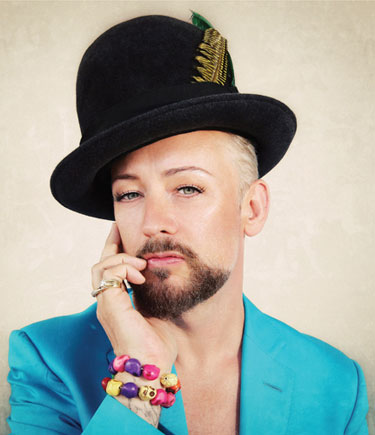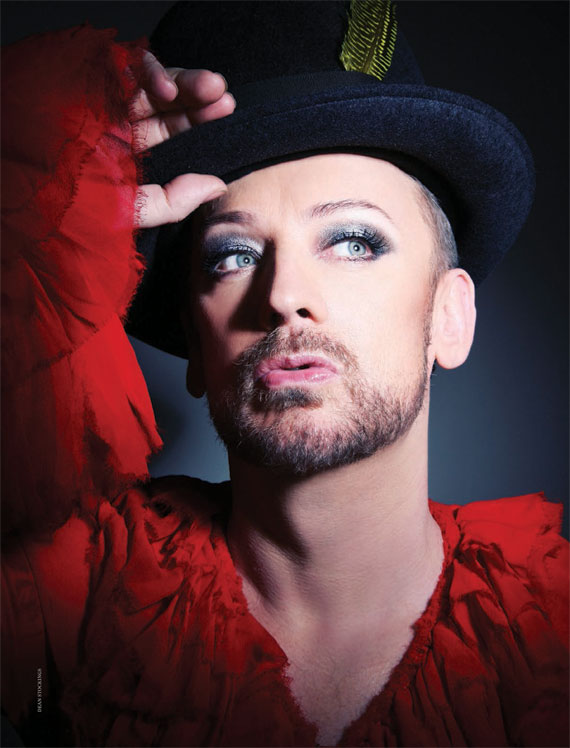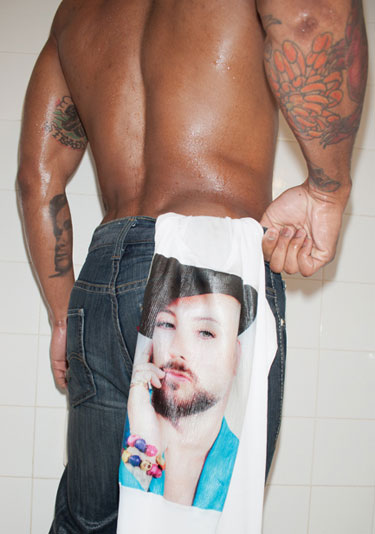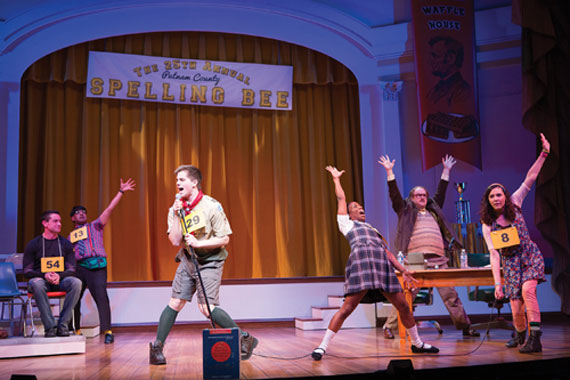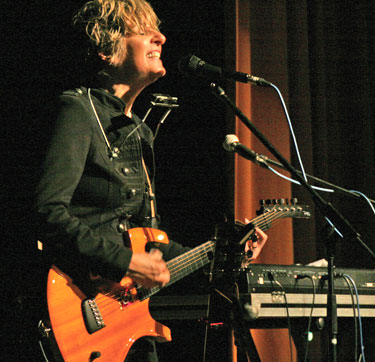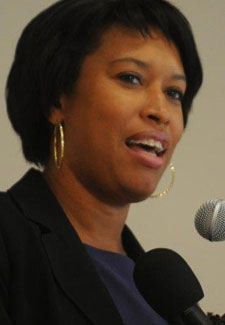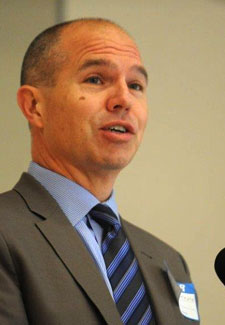Feature Story:
"That's got more swing than a hooker with a broken heel and a brick in her handbag."
In addition to a steady flow of swinging deep house tunes, Boy George's Club Culture podcast also features colorful commentary between tracks as only the '80s-era gay pop star would deliver. He made the above comment, for example, on his podcast's ninth episode, posted in December, in response to the track "My Bassline Friend" by Simone Vitullo & Do Santos.
Yes, Boy George is a house music DJ these days -- a very fine one. But he's also still making pop music. Just last week he released This Is What I Do, his first original solo album in 18 years. He's even preparing to record new music with Culture Club, the British band that made him a household name and staple on MTV in its early influential days. It was 30 years ago this year that Culture Club won as Best New Artist at the Grammys. "Thanks America," Boy George said in accepting the award. "You've got style, you've got taste, and you know a good drag queen when you see one." Mind you, this was long before drag queens became anything close to mainstream -- nearly a whole decade before RuPaul emerged on the scene.
![Boy George]()
Boy George
The man born almost 53 years ago as George Alan O'Dowd, one of six in an Irish family living in England, isn't nearly as androgynous or even as flamboyant as he was thirty years ago. He's far more grounded, both in voice and in deed. After several well-publicized bouts with drug addictions over the decades, Boy George got sober and became a practicing Buddhist, and he credits the philosophy with helping keep him on a good path. And that good path includes a long-overdue return to the United States as a singer. In a few weeks he'll front a nine-piece band in concert at the 9:30 Club. Expect it be a swinging good time -- with or without hookers, heels or handbags.
METRO WEEKLY: It's been a while since you've toured the states. When was the last time exactly?
BOY GEORGE: Uh, yeah. It's certainly been a long, long time. I think the last time I really played live in America was with Culture Club, which would have been about 14 or 15 years ago.
MW: People will be getting a different experience from the last time.
BOY GEORGE: [Laughs.] Oh, yeah, much better. I mean this is a totally different thing. It's a different time in my life. Just so different. It's going to be exciting for me. I'm bringing something that I'm really proud of. We did a few dates last year in the U.K. We're kind of starting with a tour of England, and then we go to Europe, and then we go to America. By the time we get to America we should be firing on all cylinders. It's been a difficult thing to get the whole band there. Because it's a big band, a nine-piece band, with three brass players. Everybody in the band is kind of a friend, and it's a really nice unit.
MW: This is a tour in support of your new album. How much does that factor into the concert?
BOY GEORGE: How it worked in the U.K. last year -- the album came out a month before we went on tour, and people seemed to be very much engaged with the record. People were singing along to the new songs. I'm expecting that this tour will be attracting pretty hardcore fans. It's not a massive tour. It's not a stadium tour. It's quite intimate. I think it's going to be sort-of ardent followers. And I'm hoping that they'll have done some of their homework with the music. [Laughs.] But I think for me, it's been a long time since I've put out a record, so the reaction in the U.K. was very positive. I think people have waited so long for a new record, and they've heard the old stuff so much. It's not exactly a novelty to hear the stuff from the past. I mean we kind of factor some of that in. Obviously when you do a live show, whoever you are, you want to give people a bit of familiar stuff. Maybe some things they've never heard, maybe some interesting to make the show interesting for yourself as well. You have to strike a pretty fine balance. But I've been doing this for a while so I think I'll be able to pull it off. [Laughs.]
MW: Well, in listening to the new album one thing that really struck me is that you reference God at several points.
BOY GEORGE: Well, I always have I think. He/she has always been there somewhere.
MW: So religion still plays a big role in your life? How do you identify now in terms of religion?
BOY GEORGE: Well, I don't think I do identify with religion as such. I've always been fascinated by the kind of theater and drama of -- you say religion, I think just faith and spirituality. Be it sort-of exotic, Asian religions like Krishna Consciousness or Buddhism. I think for a writer it's a very fascinating subject, because even if you reject it, it still plays a huge role in our lives. Even if you're an atheist -- which I'm not -- it's still everywhere you go. And there's so much conflict in the world based around people's ideas of faith. Conflicts about sexuality, conflicts about everything. So it's there. It's omnipresent. It's everywhere in our lives. And I think also for a gay man, it's a big issue. It's a big subject. How it reflects on our sexuality, the way that people kind of make judgments based on whatever they may believe, or how they've interpreted their doctrine. So it's something that you can't really shy away from. And I suppose, rather naively, I looked for the good in it. [Laughs.] In the same way that, you know, I've always sung reggae music, and people think of reggae music as being very homophobic.
I suppose I'm one of those people who likes to get in the middle of things. I think that's another way of understanding them. In a funny sort of way I'm drawn to stuff that opposes me. That's just a Gemini thing I think. The stuff that tries to push me away, whether it's religion, boys -- I think it's that duality/twin sort-of madness. I don't know, I'm kind of interested in animosity. I think it's a writer thing as well. You think, well, what is it about this issue? It's always people -- it always comes down to individual people's ideas about what's right and wrong. It's a fascinating minefield of a subject for a writer, which is primarily what I see myself as, really.
![Boy George]()
Boy George
MW: It's true you've long referenced God in your music. You had a band called Jesus Loves You for a while 25 years ago. But have your views changed since then?
BOY GEORGE: I don't think my views have really ever changed. I'm one of those just-in-case people. So I believe everything. I believe there's a wizard behind the curtain. I believe all of that stuff. I don't discount anything, because I don't think you can. I think faith and love are all about the unknowingness really. That's where the power lies, in the fact that none of us are really, really sure, you know? And the ones that are really sure -- the really mad ones, sort-of unflinching -- they're the people you can't really have a fluid conversation with. And you wouldn't really want to base your belief system on someone like that. So I think you have to keep an open mind with faith and spirituality; with all things in life.
And I think all these things are kind of fluid and they do change. And when you grow up a bit, you change. When I was 19 I was very, very anti-the whole thing. As a teenager I thought, "Oh, I don't believe in God. People that do are mad." But as I've got older -- I mean, I'm a practicing Buddhist. I've always embraced the idea of something more than this. There's got to be more than this. But I've never been particularly literal about it. I practice Buddhism every day, and it adds something to my life as it is right now. I feel like Buddhism is a new ingredient that's added something to all the wonderful things going on in my life right now. Added another light to what there is already. And I don't think I'd be able to practice Buddhism if I wasn't in a good place.
A lot of people have said to me, "Oh, has it helped you get clean and all this?" I think, well no, it hasn't actually. I got myself clean. I feel like it's something I've been able to come back to because I'm clean and because I'm in a pretty good state of mind. Buddhism isn't really a religion, it's more of a philosophy. It's not like Catholicism. The way I describe myself is, I'm Catholic in my complications, Buddhist in my aspirations.
MW: Because you were raised Catholic?
BOY GEORGE: Very, very, very, very loosely and sketchily. My family, they go to church now. It's a regular thing. Our priest, he's like a family friend. Which is kind of very traditionally old Irish, you know. Back in the day, you used to hear stories about the priest coming around to the family home. But obviously it was a very different relationship back then. The priest was an oppressive figure that came around to make sure you weren't using contraception -- this is Ireland, you know. Came around to make sure you were pregnant, basically. [Laughs.] Which all the women were back then. It's a slightly different relationship now. Our family priest is a lovely man, and he's part of the family.
I've got friends who had very oppressive relationships with religion growing up, so they have a very different kind of attitude. I think it's always about how it's brought to you as a kid, isn't it? We never had any of that kind of fear and loathing, or fire and brimstone. It was never presented to us in that way. So, I suppose that's why I have a kind of pretty easy relationship with all of that stuff. But I have questions, like any sane person.
MW: Are you still close with your family?
BOY GEORGE: Very, very close. I've always been close to my family. I think having a big family has been a very good thing for me, because there's always someone to watch your back. And maybe remind you when you're not really behaving that well. Or messing up your life. It's quite good to have a big Irish, interfering family. [Laughs.]
MW: Were they supportive of you in your interest in being a performer?
BOY GEORGE: I think my family was really quite relieved when I finally started a band, because I was meandering for a while, and nobody really knew what I was going to end up doing. I left school with no qualifications whatsoever. And I lived on my wits for a number of years. And when I finally got the band together, I think everybody was quite relieved. You hear stories about families being really disappointed when their kids become musicians. Mine were like, "Oh, that's what you're going to do. Well, that's great. Well, that's something." It felt like it was a positive thing to my family. I think they were quite pleased. And also it happened really quickly for me. Once I decided I was going to make music, my career was kind of an overnight thing. Suddenly I was famous. It was just kind of bonkers, really.
MW: I know I've read it before, but I don't remember: How did you get the name Boy George?
BOY GEORGE: Well I've always worn a lot of makeup, and I probably wore a whole lot more makeup when I was 17, 18. I remember we did some early photos for the band. And Jon Moss was going around to record companies. And everybody was like, "Who's the girl? Wow, she's beautiful! What's her name?" And Jon was like, "No, that's George." So it kind of became a bit of a joke, because everywhere we'd go, people obviously thought I was a girl. People saw photos and thought I was a girl. And so I added the "Boy" as a sort-of humorous tack.
MW: And how do you feel about it now, being a middle-aged man still known the world over by the nickname Boy?
BOY GEORGE: As opposed to Man George? Well, I don't feel like I have such a battle with my gender role or my sexual identity as I did at 17. But I'm not going to become the artist Formerly Known as Boy George. I mean, it's my stage name, you know? I'm quite aware of the fact that I'm not a boy. I mean I'm definitely male. But I'm quite aware that I'm 52. It's not like I'm deluding myself.
MW: I think it still can be shocking for people to see somebody who is androgynous, the way you were when you came onto the scene more than 30 years ago. Do you feel like the culture has progressed any?
BOY GEORGE: There's always somebody who's going to get freaked out. You know, the world is quite normal in a lot of ways, and if you get into a lift in a hotel with makeup on and a funky hat and some snazzy clothes, there's always somebody that's going to get a little uptight about it. I don't think the world has changed dramatically. You know what I mean? Obviously if people recognize you, then you're someone famous, and that generally removes any kind of hostility. Because when you're famous you kind of get away with being a little bit more than everyone else. But if people don't know who you are, they're still kind of as awkward as they have ever been. I don't think it's changed. Generally the world is pretty normal. Most people go out of their way to kind of assimilate. Everybody wears the same kind of clothes. There's a kind of general uniform that people wear, whether they're into hip-hop or rock-and-roll. Or they just have no relationship with fashion at all.
In some ways the world is less homophobic, because you know we see gay people on TV. People know the word gay, it's part of the culture now. So people are less homophobic in some ways, and more homophobic in other ways. It's a funny old thing.
MW: We still don't see a huge gay megastar, who's constantly on top of the charts, or a gay leading man who stars in hit blockbuster movies.
BOY GEORGE: I think America is very interesting at the moment. Because who would have thought that America would be the place where black athletes would come out? So I think in a way it's a very interesting time. I think it's kind of profound in a way, that America's the place where we are getting our first athletes. But not just athletes, black athletes. I think it's very significant. It's amazing to me. It makes me feel kind of, I don't know, proud of America. [Laughs.] It's radical. It is radical.
![Boy George]()
Boy George
(Photo by Todd Franson)
MW: When you first started out, did people tell you to act more normal, or tone down your androgynous appearance?
OY GEORGE: [Laughs.] No, no. Nobody told me that. The first time Culture Club appeared on TV, the reaction from the industry was quite hostile. People wrote in the press, "What is it? What is that thing?" And a lot of the TV shows that we were booked on cancelled us. But the public reaction was very warm. And positive. And that's always kind of been the way with me. Whatever's happened in terms of the media, and the industry -- people on the street have always been quite sweet to me. People when I meet them seem to kind of like me. And that was really what happened in the beginning of my career. I came to music already kind of quite out there. I had been dressing up in the clubs, and I was quite eccentric. So nobody would have told me, dress down, or be more normal. No, they would never have done that. I was quite formidable at 19.
MW: Is it true Culture Club is getting back together and has plans to release new music?
BOY GEORGE: Yeah, we are looking to start recording in May of this year -- at least do some of the recording that we've been planning. [A revived] Culture Club is kind of the next part of my master plan.
MW: What else is part of Boy George's master plan?
BOY GEORGE: Obviously, at the moment it's a very exciting time. There's lots of great things happening. For me, I feel like it's a real musical time. I feel like, when I played last year, when I did live shows last year it really felt like people were listening, as opposed to kind of in the old days, there was a slightly more obsessive kind of attitude towards me, and I don't think people were particularly listening to what I was doing. And this time around it was slightly more musical and it felt like people were listening more. And I think having been DJ'ing for the past 25 years, having a long break has been a kind of positive thing in a way. Because it feels like people are kind of focusing on what I'm doing musically, and less on the kind of surface stuff, which is what I want. So in a way the master plan is to kind of have more of that really, and make it much more of a musical kind of thing. And that seems to be what's happening.
MW: How does the music you play as a DJ differ from your own music?
BOY GEORGE: DJ'ing is really a parallel universe. It's so different from what I do with the band. And it's not the kind of dance music you're going to hear on the radio. I don't play what you call EDM. I play underground dance music. If people want to hear what I play, there's a podcast every month on iTunes. It's called Club Culture. DJ Boy George. And it really tells you what I play. It's free. I use it kind of as an advertisement, because people do get very confused about what I do as a DJ. I'm sure people think I play '80s music, which I don't. I don't play pop dance either. It's very underground. So generally if you like what I do musically, you will not like what I do as a DJ. [Laughs.] You do sometimes get people wandering into my DJ sets, clutching '80s albums, and they generally end up quite disappointed.
MW: Do you DJ in the states very often?
BOY GEORGE: Yeah, I do. I've DJ'ed a lot in the states. I was there last year for six weeks, and I had a great time. I was in Miami just before Christmas DJ'ing. And I should be doing dates obviously over there this year. But not while I'm doing the live shows.
MW: So you won't have offer a DJ set the same night as your live set, perhaps at a different venue, as some artists have done in recent years?
BOY GEORGE: No, because usually promoters get very kind of uptight about that. It distracts. So we try to keep the two things very separate. So usually I put DJ Boy George when I DJ so people know that it's not a live show.
MW: The last thing I wanted to ask you about is Taboo, your decade-old musical that had original productions on London's West End and New York's Broadway. Are there plans for a revival of that?
BOY GEORGE: Last year we re-wrote Taboo, myself and Mark Davies Markham, who was the original book writer. And I think we've written the best version ever of Taboo. And we are talking to people in Europe about doing a workshop this year. We had a surprise hit with Taboo in London last year. We had like a six/seven-month run. We won a Best Off West End Award [from the website WhatsOnStage.com]. So there's life in the old dog yet, I believe. And it would be great to bring it back to America, but Off Broadway. Somewhere a little bit funky. But yeah, there are definitely plans for another version of Taboo.
Boy George performs Monday, April 21, at Nightclub 9:30, 815 V St. NW. Doors at 7 p.m. Tickets are $35. Call 202-265-0930 or visit 930.com.
...
more
